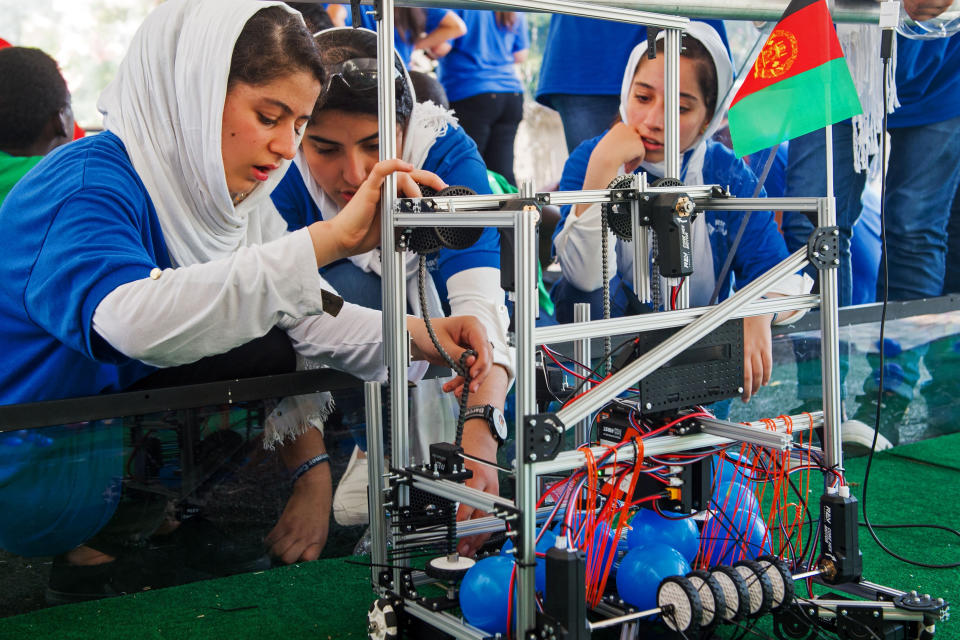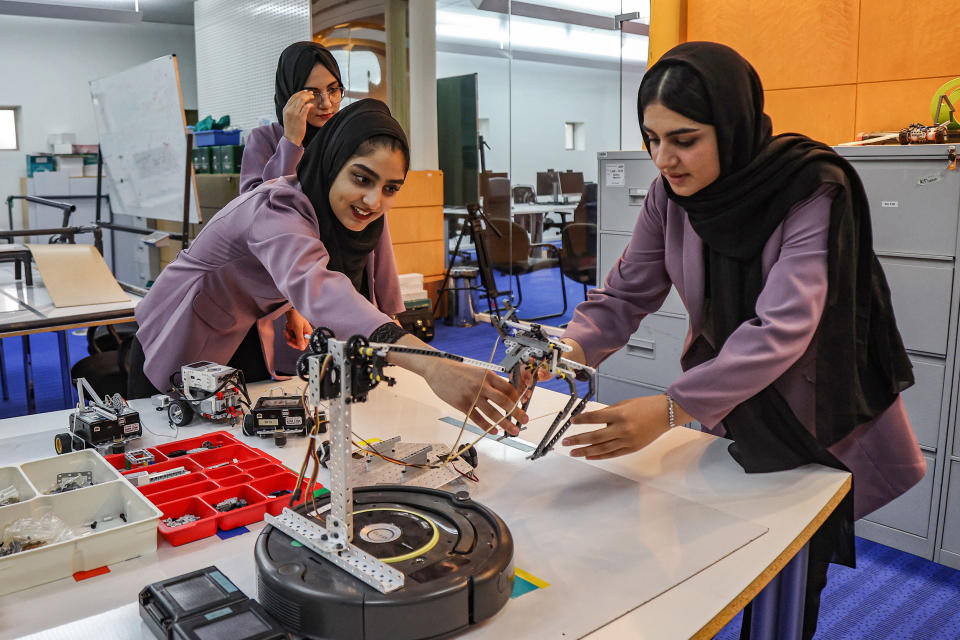Afghan girls robotics team makes a home in Qatar, mourning lives left behind
One of the newest members of the pioneering Afghan girls robotics team wants the world to know that after the Taliban takeover, women in her homeland are still striving for their rights and thirsting for education.
The young woman, 19-year-old Afsana Ahmadi, also said she misses her dad, terribly.
“When I left Afghanistan, it was the last time I saw him,” she said in a Zoom interview with NBC News to mark International Women’s Day.
Ahmadi, who hails from the city of Herat in western Afghanistan, said her father accompanied her to Kabul last summer and wept when she was evacuated to Qatar, where most of the team is now based.
“He cried with me and told me that, ‘Dear Afsana, never ever be hopeless and continue your path,’” she said. “I really miss him.”
Known at home as the “robot girls,” Ahmadi is part of an all-woman team that became a symbol of Afghan progress by taking part in competitions around the world where budding scientists show off their latest robotic creations.

The team became famous in 2017 when the United States twice denied members visas needed to compete in the country. Then-President Donald Trump stepped in, and they were able to attend.
When the Taliban returned to power in 2021, most of the team fled to Qatar fearing that the arch-conservative Islamic regime would once again impose draconian rules that would bar women from attending school or work outside the home. The Taliban, which had initially said they had modernized during their 20 years out of power, soon began to make it impossible for women and girls to go to work and school.
The Taliban say they support the education and employment of women "within the bounds of Shariah," or Islamic law. The interpretation of Shariah varies widely, and some Afghans and experts accuse the fundamentalist Taliban of imposing archaic tribal traditions specific to the Taliban onto the rest of the country.
On Wednesday, foreign ministers from the United States, European Union and dozens of other countries released a statement saying, in part, that since the return of the Taliban, "Afghan women and girls have been denied access to secondary education, to higher education, to public and political spaces, and to employment opportunities."
Ahmadi, who didn’t leave for Qatar until 2022, lived for almost a year under the rule of the Taliban, which had previously been in power from 1996 to 2001.
“So it was kind of shocking news for me and kind of going in a way that I don’t know what to do,” she said.
Fellow team member Sadaf Hamidi, 19, who left for Qatar in 2021, said she has gotten horrifying reports from her family about how the Taliban have changed life for women.
“One of my sisters used to be a medical student, the other one was high school student,” Hamidy said. “But right now they have to stay at home and they cannot continue their education. … This is heartbreaking for me and for them.”
Team captain Florence Pouya, 17, said they think constantly “about the other girls in Afghanistan, who cannot even go to school.” She said that motivates them to try harder.
“We are not just the robotics team; we are not just building the robot,” she said.

Ahmadi said that while the “Afghan Dreamers” were making their mark on the international stage, word of their scientific exploits reached her in Herat as the Taliban were making life harder for women.
“It was like kind of a hope,” she said. “It was kind of a light like inside of you that pushed us to not surrender to the life. Continue, it’s not the end point.”
Inspired by their example, Ahmadi was determined to join “this amazing team,” a younger generation of which was still operating in Herat. And after running through a series of interviews and tests, she made the team.
But as the Taliban tightened their grip, it became increasingly clear to Ahmadi that if she wanted to become a scientist, she would have to leave Afghanistan and say goodbye to everyone she knows and loves. And she would have to do so by herself.
“No, I left the country alone,” she said. “So like the situation was difficult for girls to leave the country, and it’s still difficult to leave the country, you know, without a person that can accompany them.”
For now, home is a compound in Qatar she shares with other team members.
“I’m so thankful for having this opportunity,” Ahmadi said. “At the same time, I do wish that my friends and all my classmates, they have this opportunity too.”
Ahmadi said she has been in touch with family and friends and life in Afghanistan right now is “clearly difficult.”
But as a member of the robotics team, Ahmadi said they have been able to show the world that Afghan women are capable of doing “amazing” things.
“I can be the voice of my friends and I can do something from here that can help them,” she said.
This article was originally published on NBCNews.com

